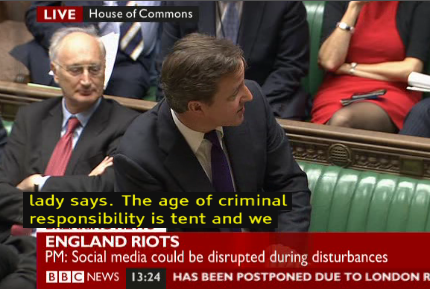Today’s emergency riots debate in the House of Commons told us one thing: MPs don’t understand social media

 I’ve been watching today’s debate in the House of Commons about the response to riots across the UK. Others are better placed to analyse the substance of the security or policing response but I will focus on just one point: how MPs and the Prime Minister have been referring to social media, and specifically controlling it, and how this shows a fundamental misunderstanding of the medium.
I’ve been watching today’s debate in the House of Commons about the response to riots across the UK. Others are better placed to analyse the substance of the security or policing response but I will focus on just one point: how MPs and the Prime Minister have been referring to social media, and specifically controlling it, and how this shows a fundamental misunderstanding of the medium.
1. Freedom of speech
Nick Clegg pledged a return of British freedoms. Freedom of speech is a crucial part of this. Any effort to close down or censor the internet or social media is a restriction on the free speech of the population, and as such is dangerous. Remember that upwards of 30 million Brits (more than half the population) use social media. We do not want the UK emulating Belarus and China.
2. Social media is useful, but not vital, for emergency communications
Parallels have been drawn in today’s debate between the response to the riots and the 2005 terrorist attacks in London when access to mobile phone networks was restricted. In the latter this was so as to ensure emergency services could communicate with each other. No emergency service’s communications are dependent on any social media technology, and there is no evidence that net access needed to be restricted for this purpose, so there is no emergency case for closing social media sites.
3. Restricting social media deals with the symptom, not the cause
There is no way to stop people communicating within a community. If they want a riot they will find ways to do so. Networking via social media is the symptom of anger shown by people – social media is not the cause of the violence. People have always had ways to organise violence or protest, and they will find ways to do so with social media or without it.
4. Targeting any system(s) will not work
Even if BlackBerry Messenger had been closed during the violence in Tottenham (as local MP David Lammy advocated, wrongly in my view), other technologies could have been used instead. BlackBerry Messenger is not – strictly defined – social media anyway. It’s more akin to Skype or MSN Messenger. But the issue here is clear – if you shut one means of communication, another can be opened very swiftly. Anyone with a basic understanding of technology can see that.
5. Social media can be used to reassure a population, and to organise a cleanup
I used Twitter to check on the situation at home in Bow when I was in West London, and to plan a route to Kentish Town by bicycle to avoid any flash points. Other Twitter users were happy to help. Stella Creasy MP has done brilliant work networking with and reassuring the people of Walthamstow, while across London cleanups have been organised primarily via Twitter. Cutting off social media cuts off all of these tremendous solutions.
So then, David Cameron and the vast majority of backbenchers, it’s time to learn a few lessons about social media and technology in light of the riots!